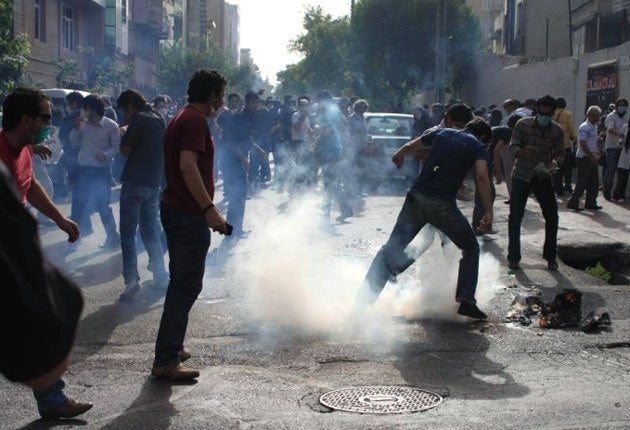Shots fired to clear streets as Iranians defy ban on protests
Security forces confront student demonstrators

Your support helps us to tell the story
From reproductive rights to climate change to Big Tech, The Independent is on the ground when the story is developing. Whether it's investigating the financials of Elon Musk's pro-Trump PAC or producing our latest documentary, 'The A Word', which shines a light on the American women fighting for reproductive rights, we know how important it is to parse out the facts from the messaging.
At such a critical moment in US history, we need reporters on the ground. Your donation allows us to keep sending journalists to speak to both sides of the story.
The Independent is trusted by Americans across the entire political spectrum. And unlike many other quality news outlets, we choose not to lock Americans out of our reporting and analysis with paywalls. We believe quality journalism should be available to everyone, paid for by those who can afford it.
Your support makes all the difference.Fresh unrest broke out on the streets of Iran yesterday when opposition protesters defied a ban on public gatherings and police fired shots in the air to disperse them.
Nearly a month after President Mahmoud Ahmadinejad was returned to power in disputed elections, provoking the worst upheaval since the 1979 Islamic revolution, an uneasy calm has returned to the capital. But that was broken as hundreds of people gathered at Enghelab Avenue near Tehran University to commemorate the anniversary of student uprisings in 1999.
The authorities had threatened to "smash" any protests, with the Tehran Governor, Morteza Tamaddon, warning that if any individuals "listen to calls by counter-revolutionary networks, they will be smashed under the feet of our aware people". But demonstrators, some wearing green masks, chanted "Death to the Dictator", made the victory sign and shouted in support for the defeated presidential candidate Mirhossein Mousavi.
It was a small showing by comparison with the massive protests which drew hundreds of thousands on to the streets last month but it was a warning to Iran's rulers that they have not fully quelled the discontent.
They took the precaution ahead of yesterday's march of suspending mobile phone coverage while text messaging has been cut off for several days and the universities closed.
In the event, those who turned out were confronted by baton-waving police, tear-gas and Basiji militias on motorbikes. The security forces were deployed at the main intersections around the university and chased the protesters whenever they attempted to regroup, witnesses told the Associated Press. A group of around 200 protesters gathered on Valiasr Street, one of Tehran's key arteries, and they too were scattered by tear gas.
Amnesty International condemned the excessive use of force and said the regime's reaction to the march demonstrated its "intolerance of dissent".
The Iranian leadership has already shown its determination to crush any signs of popular resistance by deploying the full might of the Revolutionary Guard and the feared Basiji militia, whose loyalty can be relied on thanks to special privileges, pay and other perks. Hundreds, perhaps thousands, of figures linked to the reform movement, along with journalists, bloggers and others deemed a threat to the status quo, have been arrested in the crackdown. The state-run television station Press TV quoted Iran's prosecutor general, Qorban-Ali Dorri Najafabadi, on Wednesday as saying that 500 people could face trial.
Security forces removed a leading human rights lawyer, Mohammad Ali Dadkhah, from his office on Wednesday. Mr Dadkhah is a close associate of Shirin Ebadi, the Nobel laureate, whose work promoting human rights in Iran has repeatedly drawn her into confrontation with the regime. While the arrests and the security crackdown have largely silenced the opposition, analysts believe that behind the scenes a fierce power struggle is raging that goes well beyond the dispute over the election.
Many reform-minded senior members of the religious hierarchy have not congratulated Mr Ahmadinejad on his victory, a measure of the divisions, while others have gone so far as to denounce the election results as fraudulent. One association of clerics based in the holy city of Qom even issued a statement last weekend calling the new government "illegitimate".
On the other side, Mr Ahmadinejad retains the support of the Supreme Leader Ayatollah Ali Khamenei, who is backed by a powerful coterie of conservative clerics with little interest in fostering democratic institutions or greater freedoms.
The worsening tension between these forces, rather than the sporadic eruption of street protests, is what could ultimately erode or even unravel the Islamic system under which Iran has been ruled for more than 30 years.
Join our commenting forum
Join thought-provoking conversations, follow other Independent readers and see their replies
Comments